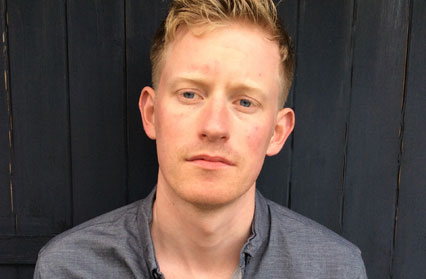While a guest at the Cork International Short Story Festival, our Fiction Editor John Lavin managed to catch up with some of the festival’s headline performers.
*
Colin Barrett
John Lavin: You were awarded the Frank O’Connor prize on the last night of the festival. How does it feel to win this prestigious award for your debut collection?
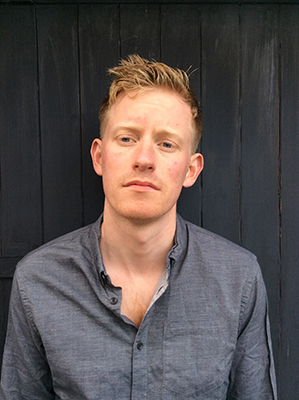
Colin Barrett: Amazing. Faintly outrageous! I was delighted of course, and it’s not something you could ever legislate for, winning so significant an award. Even to have made it onto the shortlist was a heck of an achievement, and I’d been so proud of just that. It was an award I was always aware of, and anyone going ahead and publishing in the commercially exiguous field of the short story will always have half an eye on so prestigious and generous an award. Look at the previous winners. It would have been a lifelong career dream, and an otiose one at that, to speculate that I might one day win it. I’m delighted the judges got the work and it was successfully impactful on them.
You read from your long, almost novella-length, short story ‘Calm with Horses’ at the festival. It is a work that deftly combines the brutal with the poetic, a hallmark of your prose style. Could you tell us a little bit about this story and the inspiration behind it?
My youngest brother is profoundly autistic, and the truth is that now and then I am filled with the futile urge to want to prise apart the joins and cogs of the world out of sheer rage. This is a childish and stupid feeling, and on top of its futility, it is also sentimental, indulgent, and most invidious of all, narcissistic. We tend to take the putative or real suffering of others and interpret it as a personal broadside delivered by an otherwise indifferent universe back at us. Arm, the main character of ‘Calm with Horses’, springs from that incontinent flow of self-pity, I would ultimately call it. He is on one level a version of yer common-or-garden laconic anti-hero. On another he is a big dangerous baby, who is indulged (and used) by both his smarter, drug dealing friend Dympna and the women in his life. He always justifies his actions as being obliged by his various allegiances, both to his family and Dmypna, but really he’s just a bottomless pit of boiling self-pity, and content to be passively directed. He has so much good in his life, but he throws it all away, because he thought the universe was getting personal. But the thing about the universe is it is never personal.
Much of Young Skins takes place in the fictional Mayo town of Glanbeigh. There is a great tradition of short story writers setting their work in specific locations, Joyce and Munro being two obvious examples that spring to mind. Do you think that it is important to focus a short story collection on one particular location? And if so why?
Not necessarily, but it worked for me. As I was forming the collection, I was writing other stories set in different milieus and they simply weren’t coming together as well. Fixing the stories to one locale had an energizing effect, somehow, it gave the prose an edge and intensity and pleasurable spikiness, and the characters just began to appear. So setting for me was generative: it made the writing flow better. Certainly setting – story by story – is profoundly important. More so than character, in some ways.
Finally, what’s next after Young Skins? Am I right to think that you are currently working on a novel?
Yes, though I am trickling away at stories too. But a novel is what will be next.
Nuala Ní Chonchúir
John Lavin: You read your Elizabeth Bishop short story, ‘The Boy from Petrópolis’, at the festival. Could you tell us a little bit about the piece and the inspiration behind it?
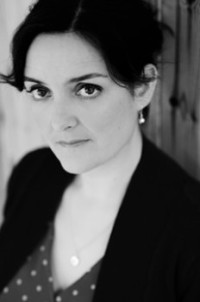
Nuala Ní Chonchúir: I was invited to Brazil to give a plenary and a reading at an Irish Studies Conference in 2012. It is, of course, a fascinating place – unlike anywhere I’d been up to that. Everything was interesting to me: the giant cockroaches, the lizards, the heat, the way people break into dance the way Irish people break into song. I came home with a lot of impressions – powdery sand, the smell of damp, the high horizon, the beauty of the Germanic Brazilians – and all of this, combined with the knowledge of Bishop’s time in Brazil, sparked the story. I wondered what it would be like to live there, as a writer, negotiating the language and the customs. Bishop’s life in Brazil was a way to explore that a little – her lover, Lota, was Brazilian and Bishop was treated as an oddity by many of Lota’s friends. Fascinating, both of them.
It was a week of unstinting high quality in Cork, celebrating the continuing rude health of the contemporary short story. Were there any events that particularly stood out for you during the festival?
I very much enjoyed my fellow reader Matt Rader’s reading. He’s a Canadian writer, better known as a poet, who has just published his first short story collection, What I Want to Tell You Goes Like This – it’s a gem.
I’ve long been a fan of Anglo-Canadian writer Alison MacLeod. Her Northern Ireland-set story, about a man dying young from cancer, was a tour-de-force.
Her fellow reader was Giller Prize-winner Lynn Coady. (I have a definite soft spot for Canadian writing.) Lynn read a contained, funny story about a maverick school teacher called Mr Hope. It was excellent. (Vimeo here: http://vimeo.com/78856532)
Your second novel, The Closet of Savage Mementos was released earlier this year to rave reviews in Ireland. The book is, as I understand it, a semi-autobiographical work. How did you approach writing such a deeply personal book? It has the feeling of a work that you simply had to write. Is this the case?
Yes, it is inspired by my own unplanned pregnancy as a 22 year-old living in Scotland. That’s the extent of the autobiography, though the main character Lillis is most definitely the melancholic version of me, and her nutty, narcissistic mother Verity is also partly me.
The hard part wasn’t the writing as the plot veers sharply from my own life – Lillis gives up her baby for adoption, I kept my son. But going back to Ullapool in the Scottish Highlands to do final research was surprisingly emotional.
Once I had the book written, I wasn’t sure I wanted it published, or that I wanted to talk about my personal life in interviews. But I dove in and that was cathartic, in ways. Still, I’m not sure I would use events from my own life so baldly again (or maybe I just wouldn’t admit it publicly…) Many people are having a hard time dividing the fact from the fiction of the book. I keep getting oddly personal questions at Q&As that would be best answered by the character, not me.
Next year sees the release of Miss Emily, which has been taken up by Penguin Books in both America and Canada. The book is about Emily Dickinson’s Irish maidservant. Could you tell us a little bit about what to expect from a novel that looks sure to be one of the literary highlights of next year?
I’m pleased to say my agent has also placed it with a UK publisher and it’s been optioned for film, so it’s been very exciting so far. (I’m not permitted to name those names yet.)
I wanted to explode the myth about Emily that she was an entirely angsty, downbeat, obsessed-with-death recluse. In fact, within her small circle, she was sociable, funny and warmhearted. And she loved to bake. Ada Concannon, a fictional Irish maid, comes to work in the Dickinson home and befriends Emily. So Miss Emily is a story of an unlikely but enriching friendship, as well as the mistress-servant relationship, emigration and family. But, of course, something untoward happens…
I had a wonderful time researching Emily Dickinson, visiting her home in Massachusetts and reading biographies and, of course, her poetry. It’s been a joy and it is ongoing. Penguin put the PR machine into gear long in advance of publication so I am very much in touch with the book, and Emily, all the time, which is lovely. Emily Dickinson, once she gets a hold of you, does not let go. And you don’t want her to.
Paul McVeigh
John Lavin: You read your short story ‘Tickles’ at the Festival. Could you tell us a little bit about the story and how you came to write it?
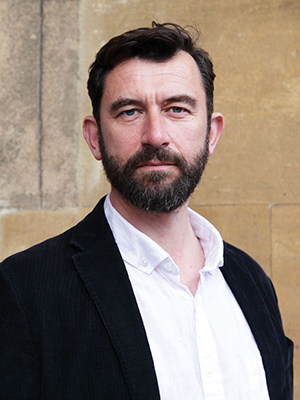
Paul McVeigh: The story lasts the duration of a hug between a son and his mother who has dementia. His mother will not let him go and, trapped by this holding from a mother who never showed affection, he is forced to confront the past, and he uncovers the reason for their estrangement.
The story was written on commission from BBC Radio 4. I’d had the idea for a story about the power of touch and touch memory many years ago but it took a long time to find the right pieces to fit together.
It was a week of unstinting high quality in Cork, celebrating the continuing rude health of the contemporary short story. Were there any events that particularly stood out for you during the festival?
There were so many. Cathy Galvin’s interview with Sally Vickers and Laura Van Den Berg was excellent and Patrick Cotter’s interview with Colin Barrett. On a personal level, the Word Factory event on Northern Irish writers meant a lot to me, being from Belfast – it was great to have a light shone on work from the region.
Richard Ford caused a bit of a stir on the first night of the Festival, claiming that the novel was ‘better’ than the short story because it was ‘bigger’. What did you make of his comments? Did you take them at face value? And if so, do you agree?
I did take them at face value at the time, but after the knee jerk reaction I think he was saying that to sustain quality writing and the complexity of a story for the duration of a novel, means that it is a harder task, and therefore a ‘bigger’ achievement for a writer. I can’t be sure but now I wonder if it was just a bit of devilment.
Your début novel, The Good Son, is being published by Salt next April. Do you think that you could tell us a little bit about what to expect from the book?
It’s the story of a young boy in the summer before he goes to secondary school. He’s a funny, quirky kid with a wild imagination who’s going through the stuff all kids have to with family, friendship and strange new feelings. He’s not exactly popular and doesn’t really want to grow up as that would mean not having his little sister as his best friend. What gives the novel a different perspective on the coming-of-age tale is it’s set in Belfast at the height of the troubles. Mickey’s mum will do anything to protect her kids from the horrors outside the front door. Mickey in turn will do anything to protect his mum and sometimes the real enemy is under your own roof. In the end it’s about how we behave under extraordinary pressure and just how far we’re prepared to go to save the ones we love.
Valerie Sirr
John Lavin: You read your short story ‘The Beautiful Rooms’ at the festival. Could you tell us a little bit about the story and how you came to write it?
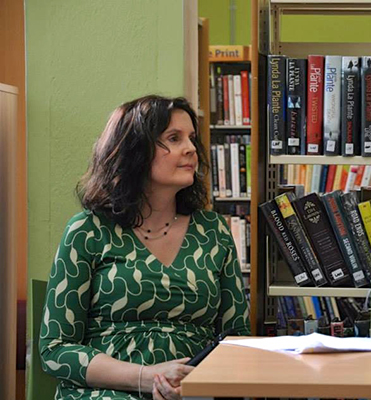
Valerie Sirr: It began with one of those ‘corner of the eye’ moments, barely registered, that came back to me much later when scribbling random notes for a story/poem, something without a form yet, that was tentatively coalescing. The notes began with a scene from an Ingmar Bergman film that had interested me, without knowing quite why, and went on to include this hardly noticed image – the chair simulator in IKEA that I had passed a few days before. I do remember being in a hurry and walking quickly past this simulator contraption thinking ‘how weird’ when I saw the chair inside a glass box, its seat being pressed on by a wooden bum shape on mechanical lever, and I remember later on, in the car, fleetingly thinking maybe I should write the image down, but then resisting writing it down, because I felt it would tie it down and I wanted to let it be. It would percolate on its own without me interfering. Then it popped up in my note scribbling a few days later.
It eventually became a story about a woman being ‘haunted’ by a character from a Bergman film – a sort of forcing to the surface of her subconscious awareness of what the film character – seen briefly years ago – represented in herself. This particular protagonist of mine wouldn’t have been prone to introspection and was reluctant to relinquish her attachment to the surface of life, particularly her attachment to things, laid out neatly in IKEA, to be stored neatly at home, helping one to ‘live a better life’, as the catalogue states. I had a bit of fun with it.
The Beautiful Rooms is also the title of your début short story collection due out later this year. Do you think that you could tell us a little bit about what to expect from the book?
As it happens, the title may be changed. But to answer your question – my own conscious analysis of the stories is still forming and there could well be elements in my own fiction that I am as yet blind to. I would quite like if I could remain blind in some ways. Like most short story writers, the material seems to come from somewhere else, a place where rational thinking is suspended and I welcome that. What does strike me, and this is as much a result of other writers’ responses to my work as my own, is that many of the stories seem to be about fragmentation – where reality itself breaks down or where the nature of reality is questioned, and sometimes a life, or a dream, is broken. Mary Morrissy kindly wrote a blurb for the back of the book: ‘The characters in The Beautiful Rooms may be broken but Valerie Sirr transforms them with her lyrical mastery of language and her humane insight, making this a powerful and haunting collection’. Gerard Beirne gave a thoughtful endorsement too saying my stories ‘…never shirk their responsibilities. They are tense explorations of human frailty told with sympathy but without sentimentality. The language is precise and revelatory. A confident and very fine début.’
Thanks for your interest in my collection, John. I hope it will be published without much more delay.
It was a week of unstinting high quality in Cork, celebrating the continuing rude health of the contemporary short story. Were there any events that particularly stood out for you during the festival?
Jennifer Matthews chaired a stimulating discussion on ‘The Long & the Short of it’ about the length of forms in fiction – short stories, novels, novellas. I was interested to hear that US short story readers tend to prefer the longer short story and that Ladette Randolph, editor of Ploughshares is creating a digital forum for distribution of the longer short story by publishing e-books of short stories upwards of 12,000 words and she is calling for submissions.
Kristina Ehin’s comments during her conversation with you at the Triskel Arts Centre struck a chord with me. She mentioned how we tell our life stories to each other almost as short stories. I guess she was referring to how we select and filter and create histories/selves, and that’s something that comes up in various ways in my own work.
Engaging though all of the analysis and discussion was, I want to be moved by short stories and of the readings I attended I found Rachel Trezise’s story both tragic and funny while those by Bernie McGill, Paul McVeigh, Brendan Mathews, Jaki McCarrick, Patrick Chapman, Nuala Ní Chonchuir, May Lan Tan were moving as well as complex.
Richard Ford caused a bit of a stir on the first night of the festival, claiming that the novel was ‘better’ than the short story because it was ‘bigger’. What did you make of his comments? Did you take them at face value? And if so, do you agree?
This came up during the panel discussion after my reading in Cork’s Central Library with Orfhlaith Foyle and Patrick Cotter and I’m glad you brought it up, because I’ve heard a few different versions of what Richard Ford said. The version that came up in the Q&A from the audience was that Ford claimed the story was ‘lesser’ than the novel. It’s curious if he claimed this and, as you say, that the novel is ‘better’ and ‘bigger’. At the time I took it to be possibly ironic, referring to how mainstream publishers often view the short story as untouchable or ‘lesser’ (difficult to sell, unpopular compared with the novel). In the Q&A I considered it at face value too, and mentioned that it’s usually the opposite that’s said i.e. that the novel is the lesser art form, the story the higher form, and poetry the highest form. Of course, as I mentioned, those generalisations don’t always prove true either. I’ve read many a flabby poem and lots of beautifully realised, intense poetic novels; and stories, like Alice Munro’s, for example, that read like novels.
On further consideration, I suppose he could have been referring to the opinion expressed for example, by Frank O’Connor in The Lonely Voice, that the essence of the short story is to portray the submerged/silenced voice of ‘The Little Man’ and that perhaps the novel is ‘better’ suited to exploring ‘bigger’ societal concerns? That’s debatable too. Then again, writers often say things for the sake of causing a bit of discussion, or because they’re thinking out loud, or in a certain context etc. His statement certainly discombobulated his audience of short story writers, which was amusing, and thought-provoking too.
Matt Rader
John Lavin: You read from your début short story collection, What I Want To Say Goes Like This, at the festival. Could you tell us a little bit about the collection and some of the inspirations behind it?
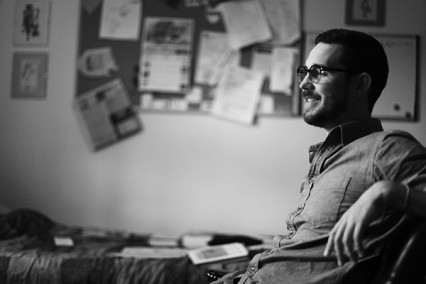
Matt Rader: The stories are all set in, or in relation to, the Comox Valley on Vancouver Island on Canada’s Pacific coast. This is a large island in a temperate rainforest. The first white settlers to the Comox Valley arrived in the 1860s and the first major industry was coal mining. My stories juxtapose contemporary life in the Comox Valley with stories from roughly 100 years earlier set in the same landscape.
The historical stories address the turbulent and dramatic labour politics on Vancouver Island in the period just prior to the First World War and in the years during the war. These struggles were directly connected to a broad range of international political intrigues that involved figures like Sun Yet Sen, Kaiser Wilhelm, and the Irish-American labour icon Mother Jones, all of whom had a hand in the proceedings on Vancouver Island. The contemporary stories pick up that tension obliquely in the relationships between friends, lovers, parents and children living their lives today in the echo of that history.
You have been mainly known as a poet until now, with three acclaimed collections to your name. What was behind your decision to move into the realm of short fiction? Do you, like many writers at the festival, consider the two forms to be quite close stylistically?
Publishing histories and writing histories are often mismatched. I’ve been writing stories since well before my first collection of poems was published. It doesn’t so much seem like a decision to move into prose stories as a decision to finally publish them, send them out into the world as a collection, and face the gaping maw of what to do next. I knew I needed to make a break with the past ten years of story writing and this was the only way I really knew how to do it.
I wouldn’t consider poetry and prose stories as different forms so much as different modes. In that both are modes for investigating imaginative experiences of the world in relatively condensed language and space, I agree that short prose fiction and poems ‘rhyme’ with each other.
However, nothing is more malleable and liminal than poetry. Poems have the full range of linguistic properties at their disposal. Grammar, punctuation, accent, sound, even the shape of the letters in some cases — in poems it can all be imbued with meaning in a way that is not available in prose. Conversely, prose can unburden language of some of those properties and let the writer collect thoughts and investigate ideas over a different range of time and space. The measure of thought is different in poetry than in prose. This yields different kinds of writerly and readerly experiences.
It was a week of unstinting high quality in Cork, celebrating the continuing rude health of the contemporary short story. Were there any events that particularly stood out for you during the week?
It was a fantastic week. One thing I admire immensely about what Pat Cotter and Munster Literature do with this festival and their Spring Poetry Festival is establish a real sense of camaraderie among the writers, guests, staff, and audience members. I would say it is a challenge to go to this festival and not find yourself corresponding with someone afterwards. I was lucky to read with Nuala Ní Conchúir who I found entirely impressive. Órfhlaith Foyle, Rachel Trezise, May-Lan Tan and Lynn Coady all gave memorable readings. I’ve been in touch with Lynn, Nuala, May-Lan, Jon Boilard (whose story I gave to 50 of my students the other day) and Hisham Bustani since the festival. This is the most outstanding feature of the festival: community.
Richard Ford caused a bit of a stir on the first night at Cork, claiming that the novel was ‘better’ than the short story because it was ‘bigger’. What did you make of his comments? Did you take them at face value? And if so, do you agree?
Ford was clear that he didn’t expect anyone to agree with him and that his pronouncements were more about him and his preferences than about any objective evaluation. It also seemed like he was trying to be a bit cheeky. But I believed him — I think that’s how he feels.
Of course, only someone of Ford’s stature in the literary world and as the headliner of the festival could say anything like that and be taken remotely seriously.
I have a lot of respect for Ford. The opening paragraph of my collection is directly indebted to his collection Rock Springs. However, if he weren’t a famous senior white guy from the United States he’d have sounded foolish. Which probably says more about us as an audience than about Ford.


